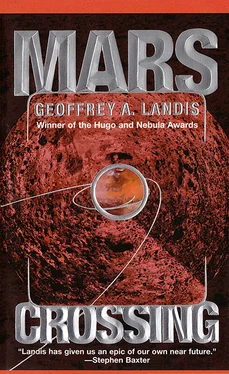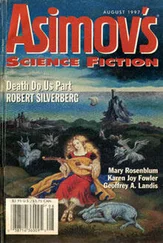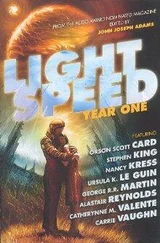It made him nervous, and being nervous made him screw up even more. There was nothing he could do about it.
Why are we so interested in going to Mars?” the lecturer had asked. He was a tall man with a potbelly and a huge black beard who waved his hands around as if he were washing invisible windows with his thumbs. He talked as if he were trying to keep up with thoughts that raced faster than he could speak; sometimes he tried to go too fast, and his words jumbled and stuck like cars in a traffic jam.
“Because it’s stomping cool,” Trevor answered.
“Right!” the lecturer said. “Right, right right! It’s way cool. But just why is it way cool?”
“Giant volcanoes,” Angie Kovalcik said. Angie was Trevor’s backup. She had won the second-place drawing. If Trevor screwed up, got sick, or for some reason was washed out of the mission, she would take his place. She was a forty-year-old housewife from New Jersey, the wife of a dentist, and in Trevor’s opinion had no right to even be considered for the mission. But when she had been told—on international television—that the second-place winner in the lottery could chose to train as a backup for the mission instead of taking the two-million-dollar second-place consolation prize, she’d said yes without even a heartbeat’s worth of hesitation.
She worked out in the gym for an hour and a half each day, and her dedication and physical shape made Trevor look like a slacker. Worse, everybody liked her. She had a knack for getting along with people, a skill that Trevor had never quite learned, and her two teenaged boys—cheering, “Go, mom, go!”—played well on television, getting almost as much air time as Trevor himself did.
Trevor hated her.
She was a constant threat at his back, seeming to whisper to him that if there’s anything wrong, if they find out that you’re not qualified, if you screw up…He knew that if they ever found out his secret, they would boot him off the team, and it was eating him away to be constantly reminded that he had a rival who would slide into his place in an instant.
Even worse, she honestly seemed to like him. She was constantly smiling, giving him advice and asking him for his, even baking cookies and acting as though she were his mom. Didn’t she realize that they were worst enemies?
They were in Houston, training, taking a crash course that was meant to bring them up to date on everything known about Mars. The instructor who was drilling them right now, Alexander Volynskji, was a biologist or a geologist or something. They were in a large lecture hall at the Lunar and Planetary Institute, although Trevor and Angie were his only two students.
“Volcanoes, sure,” he said, waving his hands dismissively. “Sure, everybody loves volcanoes. But we’re not going to Mars to look for volcanoes. Why are we going? One word: life!”
“But there is no life on Mars,” Trevor said.
“No life on Mars?” The lecturer looked at Trevor as if he were a second grader who had just confidently stated that the sun revolved around the Earth. Then he seemed to change his mind, bobbing his head and then shrugging. “Well, okay. Certainly that’s what most scientists think. I guess I’m just a heretic, an old-fashioned Percival Lowell who just refuses to see the evidence.
“But answer me this, young man. We know that life started on Earth damn near just as soon as the crust had cooled down enough to allow liquid water to pool. Now, we know that Mars was once a warmer and wetter planet. Sure, it’s a cold dry desert now, but it once had liquid water, maybe even oceans. So why shouldn’t we think that it once had life?”
“So you’re saying that we will be looking for fossils?” Angie said.
I will be looking for fossils, Trevor corrected, not we . But he kept that to himself.
“Well, sure,” Volynskji said. “Absolutely, no question, certainly. Look for fossils, yes indeed. But that’s not all you should keep your eyes out for. Look, what do we know about life on Earth? We know it’s tenacious. It lives in hot springs, at bottoms of glaciers, even on the insides of rocks. Every possible niche, what do you find? You find life.
“If there was ever life on Mars—and I tell you there was, there had to have been!—If there was life, I say it is still there. Life is tenacious. Once it got a toehold, it’s going to survive, it is going to adapt and evolve and find a way to hold on.
“Mars is dead? Sure, sure, that’s the conventional wisdom. But I, Alexander Volynskji, tell you, don’t be so sure. Maybe the robot probes couldn’t find life. But don’t close your eyes.
“Somewhere, maybe in hot springs hidden away deep inside caverns, maybe inside some volcanic crevice, maybe buried beneath the surface—somewhere, there will be life.
“Now, let me tell you about a rock from Antarctica…”
There were too many problems with his plan. Ryan started to write them down on a sheet of paper.
One, he wrote. We don’t know if Jesus do Sul even still works.
Two. It could save only three of the crew.
The Brazilian expedition had only sent two astronauts, and their return ship had not been designed with any thought of carrying a five-person crew. If they left out the Martian rocks and ice samples that the Brazilian expedition would have carried back, Ryan calculated, they would be able to easily get three of them onto the ship. But not, by any calculation, five.
He thought for a moment, then scratched it off his list. The others hadn’t been forced to face it yet, but Ryan knew that every one of them would die if they tried to stay here. Saving three of them was a step forward, not a drawback. He looked up to make sure that nobody was watching him, then went over it and obliterated the note he had written with heavy black lines until it was completely illegible. The Jesus do Sul was their only chance, and if they could only save three, it would be best to just not mention that fact until they actually made it to the pole. If they got to the pole.
Two, he wrote. Valles Marineris.
The enormous Valles Marineris stretched like a huge barrier across their path. They would have to cross it to get to the northern hemisphere. But the key to the expedition would be the rockhopper, the six-wheeled, pressurized Mars rover, and how would they carry the rockhopper up and down a vertical cliff two miles high?
They’d have to deal with it somehow.
Three, he wrote. Can we carry enough consumables?
Oxygen would come from the zirconia cells in their suits and the larger zirconia electrolyzer built into the rockhopper; as long as they had power, they would be able to break down carbon dioxide for oxygen to breathe. But what if they malfed? Could they carry enough spare parts? Could they carry enough food?
Four, he wrote, Breakdowns. The rock hopper would eventually break down; it had an expected time before failure of only one thousand kilometers. When it failed—
Five, he wrote. Not enough range.
That was the killer problem: simple distance. Ryan Martin plotted it, and came up short. They didn’t have enough range. He replotted, and even with more optimistic assumptions, there was simply no way that they could make it to the north pole. They just didn’t have the range. It was just impossible.
He leaned back and rubbed his eyes to think. There was only one other place on Mars that humans had been. Acidalia.
The landing site of the ill-fated second expedition to Mars.
Painstakingly, Ryan began to plot the path to Acidalia.
Читать дальше












